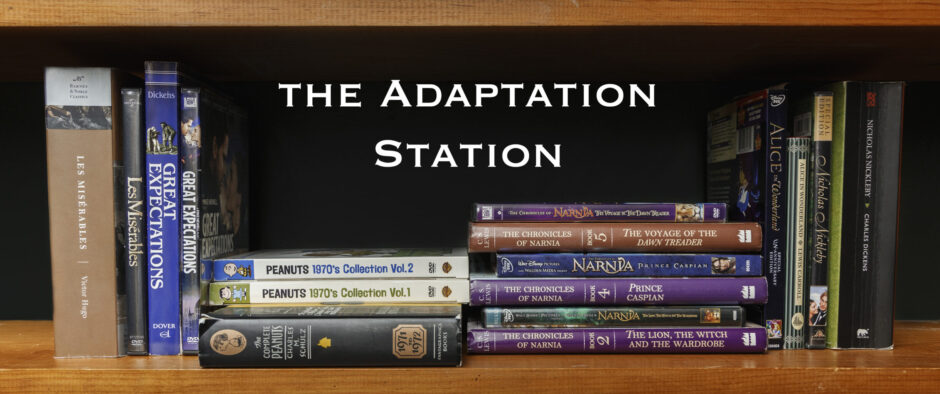Both Charles Dickens’ novel, Little Dorrit, and Andrew Davies’ 2008 miniseries adaptation of it tell the story of Arthur Clennam (Matthew Macfadyen), who returns to England after two decades of exile, working on the family business in China. He tells his stern mother (Judy Parfitt), a sort of proto-Miss Havisham, bitterly secluded in her home, that his father has died, burdened by some terrible guilt. Clennam wants to know what this guilt was, so that he can make any amends he can. But his mother angrily refuses to admit anything.
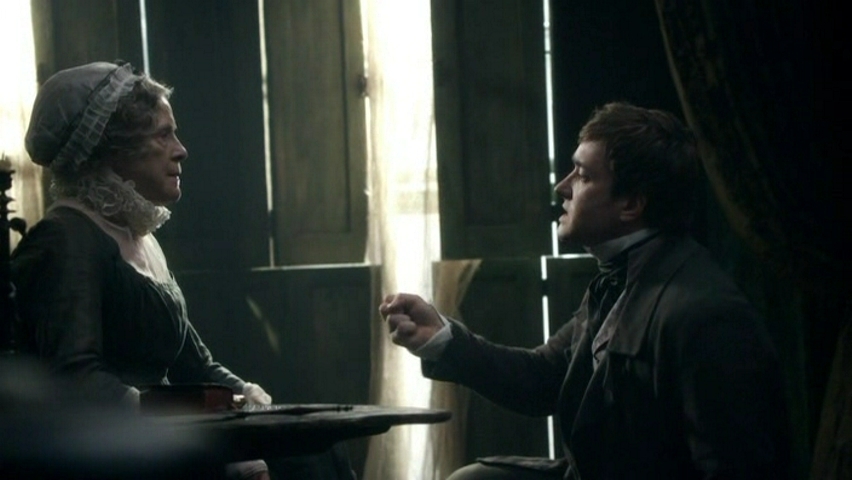
Clennam is intrigued by Little Dorrit (Claire Foy), the meek young woman who now attends Mrs. Clennam, mainly because his mother is kind to her, something she never is to anyone. He investigates and finds that Amy Dorrit is the youngest daughter of William Dorrit (Tom Courtney), a once wealthy man who has been in the Marshalsea Prison for debtors since before her birth. Partly as a coping mechanism, he takes a pride in having been imprisoned for so long, calling himself “the Father of the Marshalsea.” His anger and humiliation keep coming to the surface, however, as does his longing to be free. Though he has two other children, Little Dorrit is the one who does all the work of taking care of her father. She gets no help from her lazy, selfish older brother, Edward (Arthur Darvill) or her proud, vain older sister, Fanny (Emma Pierson.) In fact, they wouldn’t be working to support themselves if it weren’t for her.
In my last post, I praised the cast of Davies’ Bleak House, with the exception of Anna Maxwell Martin as the heroine. Well, Little Dorrit‘s cast is even greater and Claire Foy, far from being the weak link, is a highlight. She’s helped by the fact that this miniseries has better ideas for how to update the heroine than Bleak House did and by the fact that Little Dorrit doesn’t need as much updating as Esther Summerson.[1]I don’t hate Esther by the way. I’d argue she’s a great character but a bad narrator. Generally, I don’t hate Dickens’ self-effacing heroines as some do, but I concede that few of them are the best characters in their stories. I’d argue that the virtues Dickens praised in these heroines, of quietness, gentleness, humility, patience and forgiveness, are genuine virtues and if they aren’t always the most useful virtues for every situation, well, neither are the virtues of Dickens’ male heroes. But there’s a case to be made that Dickens himself was too loud, too bombastic, too egotistical, too impatient and too bitter to really make these virtues appealing. Little Dorrit, in my opinion, is an exception. Her humility feels like genuine humility rather than the showy humility of Dickens’ other heroines at their worst. And something this adaptation builds on is that she’s hardly unaware of how wrongly her family treats her. But, as it also emphasizes, she’s just as aware of how unhappy they make themselves. Her love and compassion are what keep her from resenting them. Despite having to be quiet and demure for most of her scenes, Claire Foy commands the viewers’ attention whenever the camera is on her face. She brings an unpretentious dignity to the role that puts the competitive jostling for respect of the other Dorrits to shame, and exemplifies the story’s message that, in the words of the New Testament, the greatest in the Kingdom of Heaven must be the servant of all.
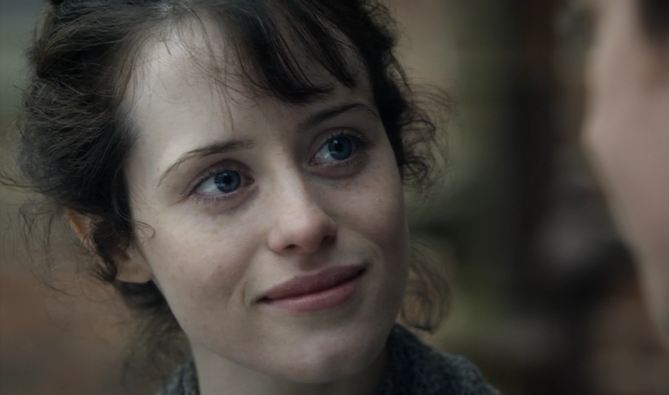
The most notable Dorrit jockeying for respect is Little Dorrit’s father of course. Tom Courtney is masterful in what in any other miniseries would be the juiciest role, a sort of Dickensian King Lear.
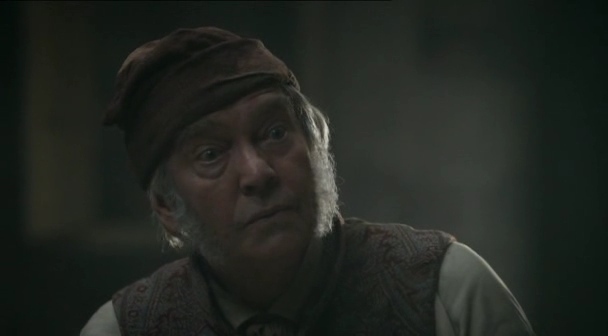
But this miniseries is so full of juicy roles that a blog post about it threatens to be a list of them. So that’s what I’ll do.
John Alderton is perfect as Mr. Casby, one of the most underrated Dickensian villains and as his daughter, Flora Finching, Arthur Clennam’s old flame, Ruth Jones is as goofy and comedic as you could wish but also shows the character’s tragic side. Annette Crosbie as the senile aunt of Flora’s dead husband steals every scene she’s in with her angry non-sequiters.
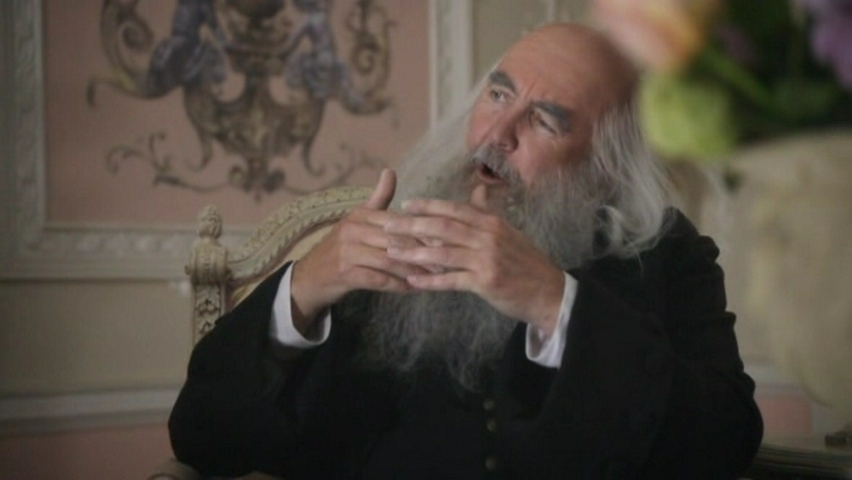

Speaking of scene-stealers, there’s Eddie Marsan as Pancks, Mr. Casby’s rent collector and amateur detective. Though for some reason, he’s portrayed as bald and lacks his literary counterpart’s wiry hair, he totally captures the character’s personality.[2]Eve Myles as Little Dorrit’s mentally retarded friend, Maggie, meanwhile has too much hair.
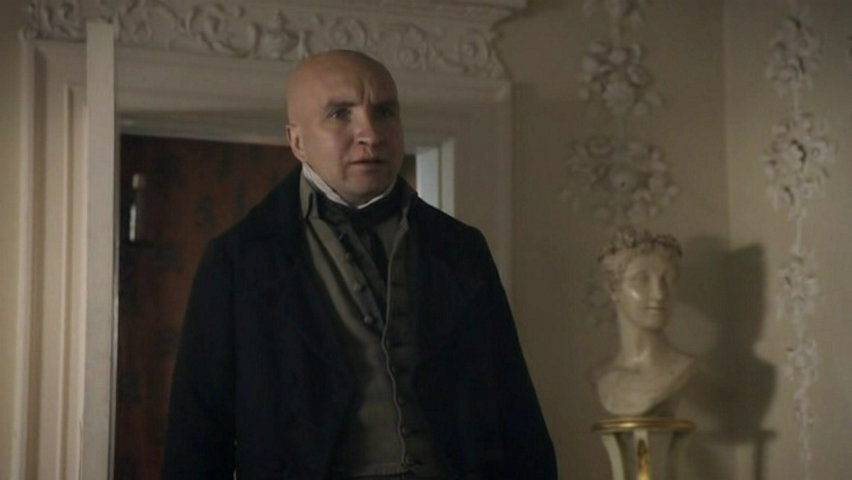
And speaking of characters who are both comedic and tragic, there’s Russell Tovey who balances dorkiness and dignity as the prison turnkey with an unrequited passion for Little Dorrit. I appreciate that this miniseries keeps his odd habit of fantasizing about inscriptions for his tombstone, which might easily have been cut for being too weird.
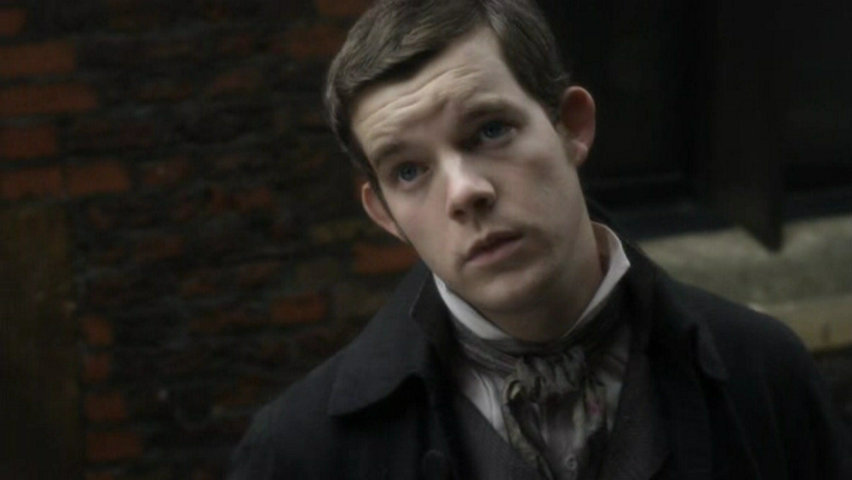
This adaptation captures Dickens’ satire of high society with Mrs. Merdle (Amanda Redman), that “high priestess of Society” and her ditzy, Wooster-esque son by her first marriage, Edmund Sparkler (Sebastian Armesto)[3]If you don’t know what Wooster-esque means, check out the Jeeves stories by P. G. Wodehouse. Seriously. Do it.
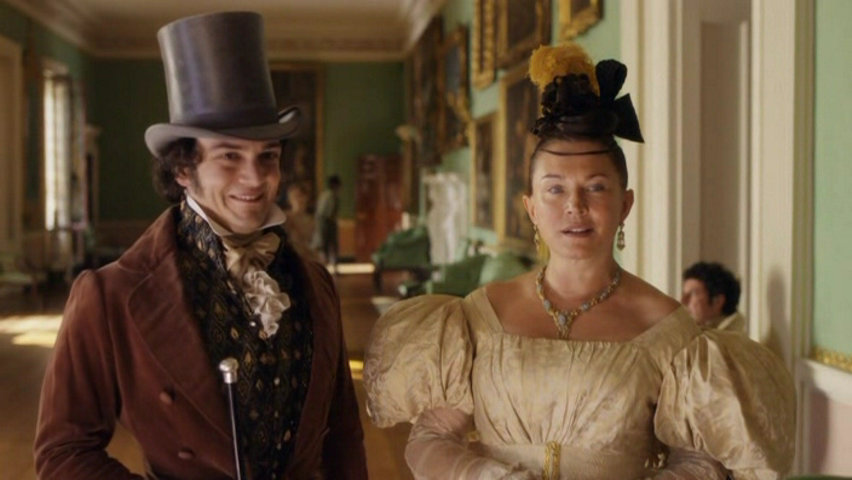
and his satire of bureaucracy as symbolized by the Barnacle family of the meticulously unhelpful Circumlocution office.

And the Cratchit-esque Plornish family goes some way to making up for the lack of the Bagnets in Bleak House.

The only performance I question-not that I dislike it, mind you, I just question it-is that of Andy Serkis as the villainous blackmailer, Rigaud. He’s so cartoony in the role that it’s kind of distracting. Not that cartooniness is a bad thing when playing a Dickens character but when you compare Serkis to his fellow cast members playing similarly cartoony characters, such as Ruth Jones or Jason Thorpe as Italian immigrant, Cavalletto, he feels like he belongs in a different miniseries. Since Rigaud is a pretty one note character, a literally hook-nosed villain[4]Well, not literally. He doesn’t have an actual hook for a nose., maybe Serkis and the series directors, Dearbhla Walsh, Adam Smith and Diarmuid Lawrence, felt the only way to make him interesting was to have him be as over the top as possible.
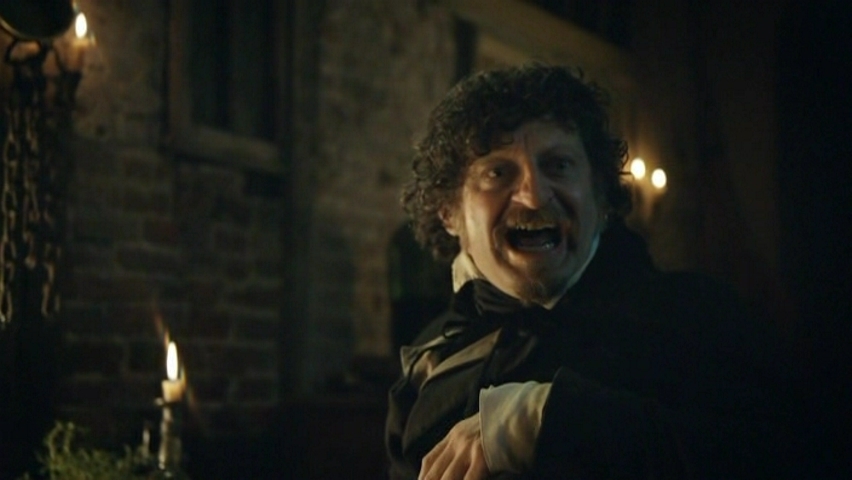
This miniseries does a better job of capturing its characters than Bleak House did. The only major personality change I can think of is that of Frederick Dorrit (James Fleet), Little Dorrit’s uncle, who is more assertive and critical of his brother here than he is in the book. (Perhaps this series felt Mr. Dorrit was such an annoying character, there needed to be someone onscreen to criticize him more often.) But he’s still the same pathetically bewildered soul.
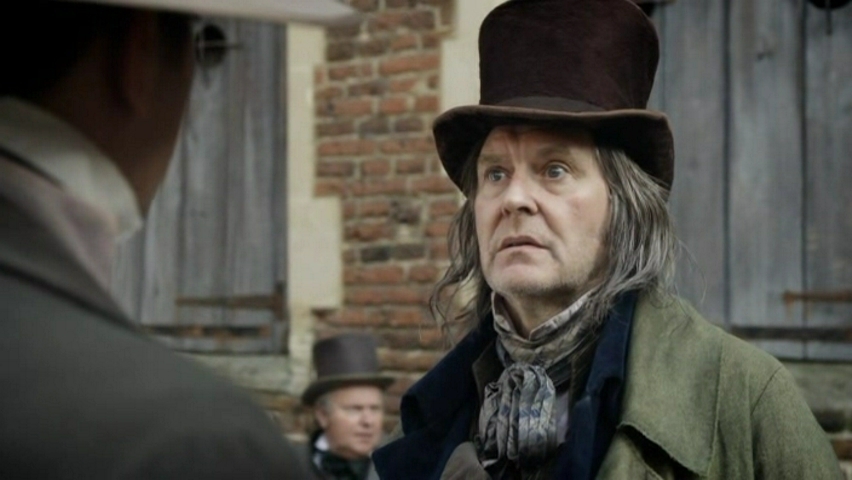
Little Dorrit’s brother loses his few redeeming qualities and becomes completely unlikeable, not that it’s much of a stretch, and while her sister has the exact same personality as in the book, she comes across as more of a comedic character than a dramatic one, but I find I don’t mind this.
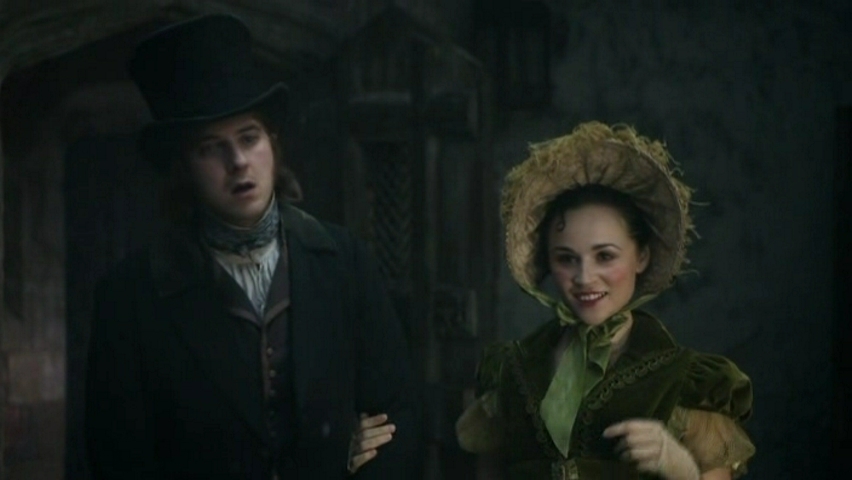
There are no disappointments like Skimpole or Boythorn or even Caddy Jellyby. Davies has gone on record as preferring Dickens’ Little Dorrit to Bleak House and I think his adaptations of them reflect that.
In my post about the 2005 Bleak House, I wrote that I applauded the creators’ idea of making the camerawork and sound mixing feel modern, but I found the results a tad obnoxious. Such is happily not the case with Little Dorrit. Here the stylizations do a great job helping viewers feel what the characters are feeling, mainly William Dorrit’s PTSD. Another improvement over Bleak House is the music. While both scores were composed by John Lunn, the musical themes for this miniseries are memorable while the ones from the other were simply functional. Also better than functional are the sets, which do a great job of establishing the characters who inhabit them, from the crumbling decrepitude of Mrs. Clennam’s house

to the oppressive cutesiness of the Casby residence

to the claustrophobic opulence of the Merdles’.

I also wrote in my last post that I feel Andrew Davies has a juvenile preoccupation with sexuality. This was happily held in check with Bleak House[5]The dialogue is a bit more explicit than the book was, but that just feels like making things clear for audiences less familiar with the euphemisms of Dickens’ culture. but rears its horny head a bit in Little Dorrit. The landlady, who in the book can’t decide whether or not Riguad is handsome, evidently makes up her mind quickly here and the two of them have an implied sexual encounter.[6]It’s also implied he murders her. I’m not sure why. Maybe he suspects she’s getting too close to his identity. Maybe the miniseries just felt it needed to make it clear … Continue reading One of Flora’s lengthy, digressive speeches has a line about private parts tucked away in it, which makes no sense for the character or the situation. What annoys me most is a throwaway line about Arthur Clennam being able to have “one or two girls” while he was in China. To be fair, he implies he could have had them rather than actually had them, but it makes no sense for his virginal character. Still, there’s nothing here as gratuitous as the erotic dream scenes in Davies’ Northanger Abbey (2007) or Les Misérables (2018.) Where he might have been expected to go craziest is the relationship between frustrated attendant, Tattycoram (Freema Ageyman) and the mysterious Miss Wade (awesomely creepy Maxine Peak.) But the miniseries is actually pretty much true to the book in that you can interpret the connection between them as homoerotic if you wish to do so, and you can just as easily not interpret it that way. The main focus is the psychological similarity between them.
However, the mention of the characters does bring us to some problems with the adaptation. As in Bleak House, Davies actually fixes some of the dramatic issues of the source material, mainly by introducing Little Dorrit herself earlier and making it clearer just what this story is going to be about, but here he also exacerbates some of them. While added scenes of Tattycoram’s growing resentment towards the Meagles family, who have taken her in, are well written, they add to the impression that the Miss Wade-Tattycoram plot is more interesting than the main plot of the Clennam and Dorrit families, in which its main function is to be something of a red herring. And having expanded on the subplot initially, the miniseries then underdevelops the rest of it compared to the book. Miss Wade’s backstory is trimmed down, understandably so since it takes up a whole chapter in the text, but the result is anticlimactic. We have a much less clear idea of what her psychological problem is.[7]A strength of Dickens, however, is that even when I don’t understand the psychology of some of his characters, like Rosa Dartle from David Copperfield or Estella from Great Expectations, I … Continue reading Tattycoram’s quarrel with her from the same scene is cut, which makes her decision to return to the Meagleses in the last episode come a bit out of nowhere. For modern readers, of course, that was always going to be a bit unsatisfying since modern society takes a dim view of adopting someone to be your servant and shares Miss Wade’s suspicion of condescension.[8]In my more cynical moments, I suspect that modern society shares Miss Wade’s paranoia of condescension. Personally, I prefer it when adaptations of classic stories stay true to dated aspects like that and try to find ways to make them work for modern audiences, rather than taking the easy way out and completely reimagining them. So I give this Little Dorrit credit for that, though I feel like there was a better way to do it, possibly by having both Tattycoram and the Meagleses apologize to each other.[9]I do think Dickens wanted us to sympathize with Miss Wade and Tattycoram’s fears to an extent. He certainly wrote a number of self righteous, patronizing do-gooder characters, such as they … Continue reading
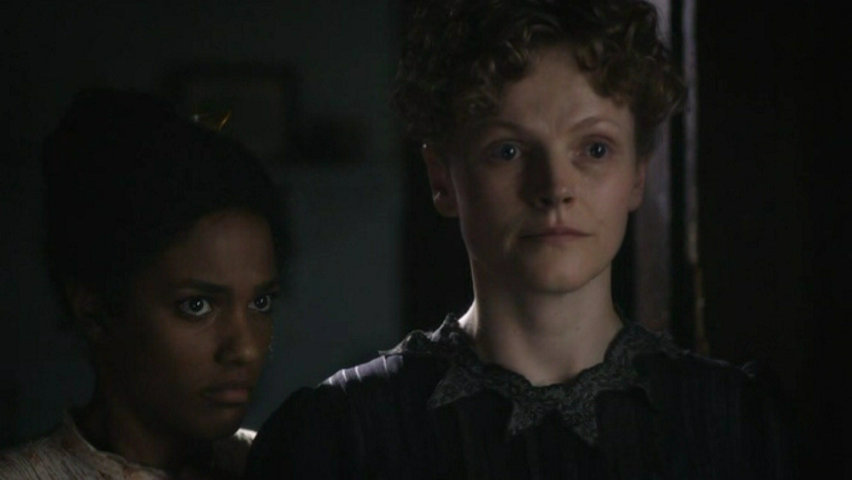
The added scenes of Miss Wade in the early episodes are in keeping with Davies’ tendency in his adaptations to try to balance all the different characters and storylines, instead of just following the point-of-view characters from the source material. Sometimes this works well, as in his Pride and Prejudice (1995) and Bleak House (2005.) Others times less well, as in his Sense and Sensibility (2008.) In Little Dorrit, it’s a bit of a mixed bag. The added scenes of Fanny Dorrit and Edmund Sparkler in the last episode are hilarious. (The book describes what happens to them in broad terms at that point in the narrative, but not in detail.) I especially love Fanny’s line about her penknife, which is original to this adaptation, yet sounds exactly as if it were written by Dickens. But added scenes throughout of Mrs. Clennam and Rigaud again exacerbate an annoying part of the book’s plot. We’re continually reminded that Mrs. Clennam has a dark secret, one connected to Little Dorrit somehow. But rather than gradually revealing it, the story waits until the climax to the dump the entire thing out. What’s more this Little Dorrit phrases part of it so that it sounds as if the romantic leads had the same father. (They don’t.) Gina Dalfonzo’s excellent Charles Dickens related blog did a post after the miniseries was aired explaining the secret and it’s hilarious how many grateful comments from confused viewers it has.[10]I’m including the post in the bibliography, trusting none of my readers will look at it before reading the book or watching the series.
You’ll notice that both of the previous paragraphs criticize the adaptation in the final episode and this isn’t an accident. As in Bleak House, the climactic episodes are the ones that take the biggest liberties to make the story more exciting and with debatable success. As a fan of the book, I’m disappointed that it omits Cavalleto’s role in forcing Rigaud to come out of hiding, especially since it plays up his fear of him so much. It would have been really satisfying to see the tables turned.(I don’t mind Pancks’s role being cut as much, since he still has plenty of awesome moments.) Affrey Flintwinch (Sue Johnston) finally standing up to her abusive husband and employer is happily kept, but is much less dramatic than in the book.
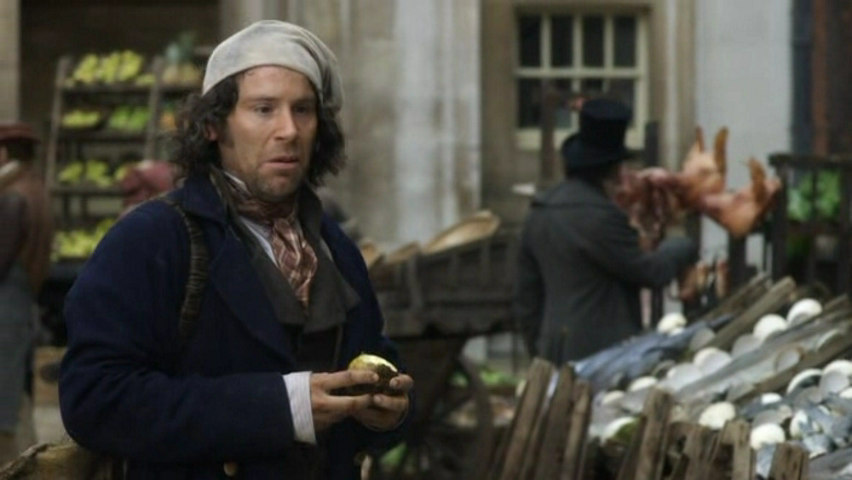
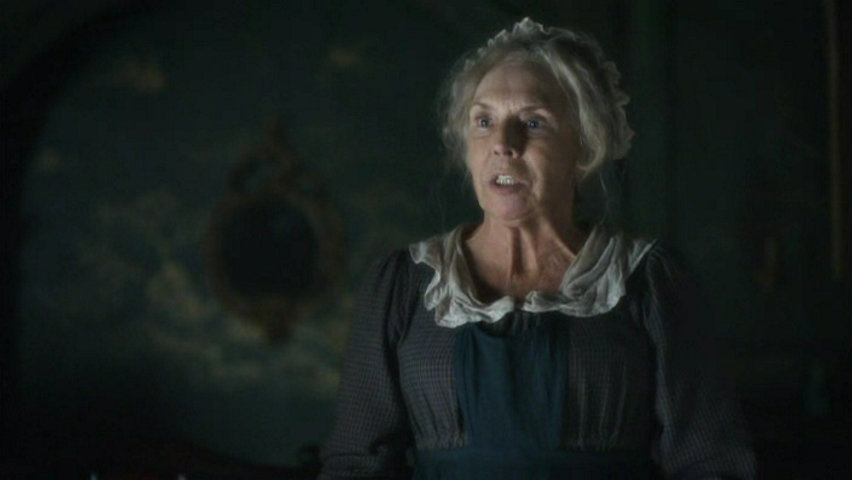
Then there’s the decision to have Arthur Clennam learn the aforementioned family secret. (In the book, he is only told about it years after the story’s main events, if ever.) On the one hand, I appreciate this change. It’s a bit annoying in the novel how the story is set in motion by Clennam’s search for the truth, but we never see his reaction to it. But this renders a major plot point, regarding Little Dorrit’s financial state, which was already a bit confusing, even more so.
But there are also a lot of things about the last episode to love, both things from the book, such as the powerful scene between Little Dorrit and Mrs. Clennam, and original things, such as the aforementioned material with Edmund Sparkler and Fanny Dorrit. As melodramatic as the story gets, and Little Dorrit has some of the wildest plot points in Dickens[11]Maybe not as wild as the spontaneous human combustion in Bleak House, but close, the actors really sell them, especially Judy Parfitt, and for me, the series still manages to go out on a high note despite its blunders.
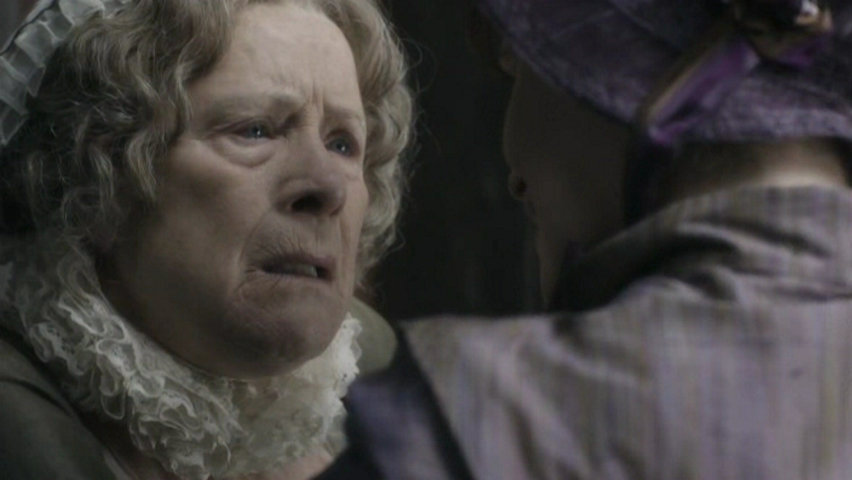
Of Andrew Davies’ Dickens adaptations, Bleak House seems to be the most well remembered. But while Little Dorrit may have bigger dramatic problems, I also feel it has greater strengths and it’s the one to which I return more often.[12]Actually, that’s pretty much how I feel about their source materials. Both of them rank among the best Dickensian miniseries, warts and all.[13]They’re certainly better adaptations than Susannah Phelps’s revisionist Oliver Twist (2007) and Great Expectations (2011) in which every character is reimagined in some way. While Jane Austen may be more his thing, Charles Dickens seems to bring out the best in Davies and it’d be great if he were to adapt another of his books for the BBC. He’s described Our Mutual Friend as a favorite of his. Perhaps that one would do.
Bibliography
Little Dorrit, by Charles Dickens (gutenberg.org)
Robert Giddings Reviews Andrew Davies-BBC-1-Bleak House (charlesdickenspage.com)
Dickensblog: The Clennam family secret: FAQs (typepad.com)
References
| ↑1 | I don’t hate Esther by the way. I’d argue she’s a great character but a bad narrator. |
|---|---|
| ↑2 | Eve Myles as Little Dorrit’s mentally retarded friend, Maggie, meanwhile has too much hair. |
| ↑3 | If you don’t know what Wooster-esque means, check out the Jeeves stories by P. G. Wodehouse. Seriously. Do it. |
| ↑4 | Well, not literally. He doesn’t have an actual hook for a nose. |
| ↑5 | The dialogue is a bit more explicit than the book was, but that just feels like making things clear for audiences less familiar with the euphemisms of Dickens’ culture. |
| ↑6 | It’s also implied he murders her. I’m not sure why. Maybe he suspects she’s getting too close to his identity. Maybe the miniseries just felt it needed to make it clear Riguad’s a bad guy. I feel Serkis’s performance rendered that unnecessary. |
| ↑7 | A strength of Dickens, however, is that even when I don’t understand the psychology of some of his characters, like Rosa Dartle from David Copperfield or Estella from Great Expectations, I still believe in them as human beings, whom I happen to not understand. |
| ↑8 | In my more cynical moments, I suspect that modern society shares Miss Wade’s paranoia of condescension. |
| ↑9 | I do think Dickens wanted us to sympathize with Miss Wade and Tattycoram’s fears to an extent. He certainly wrote a number of self righteous, patronizing do-gooder characters, such as they suspect their benefactors are. But he also saw how a fear of being condescended or patronized to could ruin someone’s life by blinding them to genuine kindness, even from flawed people. |
| ↑10 | I’m including the post in the bibliography, trusting none of my readers will look at it before reading the book or watching the series. |
| ↑11 | Maybe not as wild as the spontaneous human combustion in Bleak House, but close |
| ↑12 | Actually, that’s pretty much how I feel about their source materials. |
| ↑13 | They’re certainly better adaptations than Susannah Phelps’s revisionist Oliver Twist (2007) and Great Expectations (2011) in which every character is reimagined in some way. |
